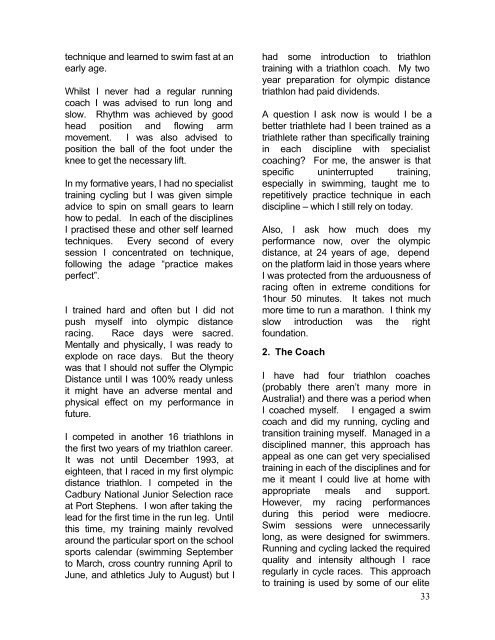MAXIMISING OLYMPIC DISTANCE TRIATHLON PERFORMANCE ...
MAXIMISING OLYMPIC DISTANCE TRIATHLON PERFORMANCE ...
MAXIMISING OLYMPIC DISTANCE TRIATHLON PERFORMANCE ...
You also want an ePaper? Increase the reach of your titles
YUMPU automatically turns print PDFs into web optimized ePapers that Google loves.
technique and learned to swim fast at anearly age.Whilst I never had a regular runningcoach I was advised to run long andslow. Rhythm was achieved by goodhead position and flowing armmovement. I was also advised toposition the ball of the foot under theknee to get the necessary lift.In my formative years, I had no specialisttraining cycling but I was given simpleadvice to spin on small gears to learnhow to pedal. In each of the disciplinesI practised these and other self learnedtechniques. Every second of everysession I concentrated on technique,following the adage “practice makesperfect”.I trained hard and often but I did notpush myself into olympic distanceracing. Race days were sacred.Mentally and physically, I was ready toexplode on race days. But the theorywas that I should not suffer the OlympicDistance until I was 100% ready unlessit might have an adverse mental andphysical effect on my performance infuture.I competed in another 16 triathlons inthe first two years of my triathlon career.It was not until December 1993, ateighteen, that I raced in my first olympicdistance triathlon. I competed in theCadbury National Junior Selection raceat Port Stephens. I won after taking thelead for the first time in the run leg. Untilthis time, my training mainly revolvedaround the particular sport on the schoolsports calendar (swimming Septemberto March, cross country running April toJune, and athletics July to August) but Ihad some introduction to triathlontraining with a triathlon coach. My twoyear preparation for olympic distancetriathlon had paid dividends.A question I ask now is would I be abetter triathlete had I been trained as atriathlete rather than specifically trainingin each discipline with specialistcoaching? For me, the answer is thatspecific uninterrupted training,especially in swimming, taught me torepetitively practice technique in eachdiscipline – which I still rely on today.Also, I ask how much does myperformance now, over the olympicdistance, at 24 years of age, dependon the platform laid in those years whereI was protected from the arduousness ofracing often in extreme conditions for1hour 50 minutes. It takes not muchmore time to run a marathon. I think myslow introduction was the rightfoundation.2. The CoachI have had four triathlon coaches(probably there aren’t many more inAustralia!) and there was a period whenI coached myself. I engaged a swimcoach and did my running, cycling andtransition training myself. Managed in adisciplined manner, this approach hasappeal as one can get very specialisedtraining in each of the disciplines and forme it meant I could live at home withappropriate meals and support.However, my racing performancesduring this period were mediocre.Swim sessions were unnecessarilylong, as were designed for swimmers.Running and cycling lacked the requiredquality and intensity although I raceregularly in cycle races. This approachto training is used by some of our elite33


